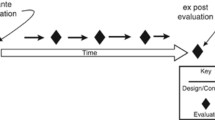Abstract
The Metasystem Paradigm postulates a hierarchy of at least three inquiring systems: at the lowest level of abstraction, an inquiring system devoted to IMPLEMENTATION; at the object level, an inquiring system devoted to MODELING; and finally, at the metalevel, an inquiring system devoted to METAMODELING. System Design is incomplete without the intervention of these three inquiring systems, each of which plays a role in System Design. System Science draws its paradigm and its epistemology from the metalevel inquiring system. Furthermore, this inquiring system is dedicated to a methodology called METAMODELING which provides MODELING (at the next-lower inquiring system) with its source of knowledge and its reasoning methods. A design is incomplete unless it takes into account both MODELING and METAMODELING. METAMODELING is to MODELING what the Theory of Design is to Design, or what Decision Making ABOUT Decision Making is to Decision Making, or what Learning to Learn is to Learning. The consequences of using an obsolete modeling paradigm are explored in relation to the discipline of operations research.
Similar content being viewed by others
References
Bateson, G. (1972).Steps to an Ecology of Mind, New York, Ballantine.
Churchman, C. W. (1979).The Systems Approach and Its Enemies, Basic Books, New York.
Dascal, M. (1989). Artificial intelligence and philosophy: The knowledge of representation.Syst. Res.,6(1), 39–52.
de Zeeuw, G. (1987). Replacing models by actors: Some ideas for metadesign. In van Gigch, J. P. (ed.),Decision Making About Decision Making: Metamodels and Metasystems, Abacus/Gordon & Breach, London, England.
Foucault, M. (1967).Les Mots et les Choses. Une Archéologie des Sciences Humaines, Gallimard, Paris.
Kinston, W. (1985). Measurement and the structure of scientific analysis.Syst. Res. 2, 95–104.
Kinston, W. (1986). Purpose and the translation of values into action.Syst. Res. 3, 147–160.
Kinston, W. (1988). A total framework for inquiry.Syst. Res. 4, 9–25.
Kinston, W. (1989). Completing the hierarchy of purpose. Paper presented to the 33rd Annual Meeting of the International Society for General Systems Research/ISSS, Edinburgh, Scotland, July.
Kuhn, T. (1970).The Structure of Scientific Revolutions, rev. ed., Chicago University Press, Chicago.
Lesourne, J. (1986). An interview with Jacques Lesourne.AFCET/INTERFACES (Bull. French Assoc. Econ. Technol. Cybernet.)48, No. 6. (in French).
Pylyshyn, Z. W. (1983). Information science: Its roots and relations as viewed from the perspective of cognitive science. In Machlup, R. and Mansfield, U. (eds.),The Study of Information. Interdisciplinary Messages, Wiley, New York.
Roy, B. (1985).Méthodologie Multicritere d'Aide à la Décision, Economica, Collection Gestion, Paris (in French).
Schank, C., and Childers, P. (1984).The Cognitive Computer. On Language, Learning, and Artificial Intelligence, Addison-Wesley, Reading, MA.
Simon, H. A. (1969/1981).Sciences of the Artificial, MIT Press, Cambridge, MA.
van Gigch, J. P. (1978).Applied General Systems Theory, 2nd ed., Harper, New York.
van Gigch, J. P. (1986). Modeling, metamodeling, and systems failures.IEEE Trans. Reliabil.R-35, No. 2.
van Gigch, J. P. (1987).Decision Making About Decision Making: Metamodels and Metasystems, Abacus/Gordon & Breach, London, England.
van Gigch, J. P. (1988). Diagnosis and metamodeling of systems failures.Syst. Pract. 1, 31–45.
van Gigch, J. P. (1989). The potential demise of OR/MS: Consequences of neglecting epistemology.Eur. J. Operat. Res. 42, 268–278.
van Gigch, J. P. (1990). Systems science, the discipline of epistemological domains, contributes to the design of the intelligent global web.Behav. Sci. 35(2), 122–137.
van Gigch, J. P. (1991).System Design Modeling and Metamodeling, Plenum, New York.
van Gigch, J. P., and Le Moigne, J. L. (1989). A paradigmatic approach to the discipline of information systems.Behav. Sci. 34(2), 128–150.
van Gigch, J. P., and Pipino, L. L. (1986). In search of a paradigm for the discipline of information systems.Int. J. Future Comput. Syst. 1(1), 71–97.
van Gigch, J. P., Borghino, J. A., Le Moigne, J. P., Logan, A. R., and Vervilos, V. (1988). A metasystemic view of a disaster: Example of the space shuttle Challenger failure.Hum. Syst. Manage. 7, 259–264.
Author information
Authors and Affiliations
Additional information
Presented to the XII World Congress in Sociology, Session on Ethics in Systems, Working Group on Sociocybernetics and Systems Theory, Madrid, July 1990.
Excerpted in part from John P. van Gigch,System Design Modeling and Metamodeling, Plenum, New York and London, 1991.
Rights and permissions
About this article
Cite this article
van Gigch, J.P. Metamodeling: The epistemology of system science. Systems Practice 6, 251–258 (1993). https://doi.org/10.1007/BF01059724
Received:
Revised:
Issue Date:
DOI: https://doi.org/10.1007/BF01059724




